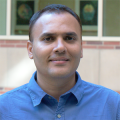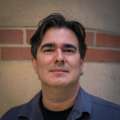Brain Mapping
Affiliated Site:
UCLA Brain Mapping Center
The mission of Brain Mapping is to define the structure and function of the human brain in health and disease. This goal has both research and educational components and uses a multidisciplinary approach to integrate information on a scale ranging from whole brain structure to the microscopic. To achieve this mission, the program is composed of faculty with expertise in brain imaging technology, neuropsychology, clinical neuroscience, computer science and bio-instrumentation.
Unlike most reductionistic approaches in medical science, where an explosion of information has resulted in ever-increasing subspecialization and diversity, Brain Mapping integrates many sources of information to produce a holistic view, the value of which is greater than the sum of its parts. Through a rich interdisciplinary collaboration, the program has a strong foundation from which the new and exciting field of Brain Mapping has grown.
The center, established in 1992 under the leadership of John Mazziotta, MD, PhD, is directed by Roger P. Woods, MD. The center has available all the techniques for the study of the human and animal nervous systems during life as well as from post-mortem tissue investigations.
Research
There are five laboratories in the Brain Mapping Program. The Magnetic Resonance Imaging Laboratory contains state-of-the-art, 1.5, 3.0 & 7.0 Tesla, echo-planar MR devices capable of conventional, functional, and spectroscopic imaging of the brain.
Research in this laboratory includes studies of both the normal and abnormal human brain. For the normal brain, ongoing experiments involve the evaluation of sensory, motor, visual, language, memory, and cognitive systems using functional MRI techniques. In addition, high-resolution anatomical imaging is being incorporated into a developing atlas of the human brain. Patient studies include the presurgical evaluation of patients with epilepsy, brain tumors, and vascular malformations. The evaluation of patients with neurodegenerative diseases and psychiatric disorders and the study of recovery of function after acute brain injury are active projects in this laboratory.
The Positron Emission Tomography Laboratory has a high-resolution dedicated brain imaging PET device optimized for cerebral activation blood flow studies. Both normal and abnormal brain function are studied with PET. The study of human hemispheric specialization is an important research topic in the PET laboratory. Studies in normal subjects evaluate the relationship between handedness and cerebral dominance, behavioral-cerebral correlations and both inter- and intra-hemispheric participation in behavioral tasks. Studies in patients include the exploration of the causes of a migraine headache, as well as the evaluation of acute and chronic neurological disorders.
The data analysis laboratory contains extensive computer facilities for data analysis and visualization.
The Transcranial Magnetic Stimulation (TMS) Laboratory has specialized equipment used to stimulate the brain directly using magnetic fields. This lab is researching the human mirror neuron system in normal subjects as well as patients with a wide range of neuro psychiatric disorders.
The EEG laboratory has a high density (128 Channel) EEG to study human neurophysiology in health and disease.
Education
The ultimate goal of Brain Mapping is to provide a means by which investigators and students can learn about brain function in health and disease through the integrated data sets collected and stored in digital brain libraries. By these methods, computer databases continually learn from the addition of new information to better characterize normal brain function and disease states, and provide a detailed circuitry of the brain's component parts. Trainees at all levels participate in laboratory activities. They range from high school summer students to post-doctoral fellows.
The Ahmanson-Lovelace Brain Mapping Building is a facility dedicated solely to the goals and missions of the program, unifying the expertise of many individuals and many methodologies under one roof. It houses the program's imaging laboratories and many of its faculty, trainees and offices. Additional space in the Neuroscience Research Building is dedicated to computation, wet-lab space and faculty offices.
There are few places in the world that have the neuroscience resources, expertise, and interests to establish a comprehensive Brain Mapping program. Thus, it is appropriate that a project of this scope and magnitude take place at UCLA.
Director
Faculty
Emeritus Faculty

Giving: Your gift to the UCLA Brain Mapping Program makes a difference.





